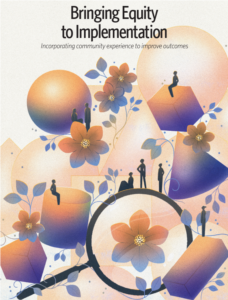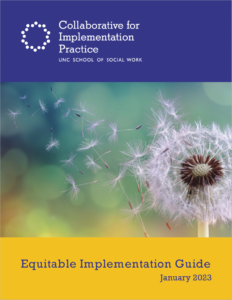 Our team had the tremendous privilege of co-editing a special supplement to the Stanford Social Innovation Review titled Bringing Equity to Implementation, which was published in the spring of 2021. Articles featured in the supplement provide case studies detailing how implementation science was explicitly used to advance equity. They also highlight strategies used with communities that provide important lessons about equity for the implementation science field.
Our team had the tremendous privilege of co-editing a special supplement to the Stanford Social Innovation Review titled Bringing Equity to Implementation, which was published in the spring of 2021. Articles featured in the supplement provide case studies detailing how implementation science was explicitly used to advance equity. They also highlight strategies used with communities that provide important lessons about equity for the implementation science field.
We closed the supplement with ten recommendations to advance equitable implementation and were almost immediately faced with an implementation conundrum: How could we help others put the recommendations into practice? Many of our partners gave us feedback that the recommendations were helpful, but only to a point. For example, no one doubted the value of “address issues of social justice,” but it needed more than a sentence-or-two description. To be truly actionable, each recommendation would benefit from further operationalization so that technical assistance providers, implementation support practitioners, and others who support change efforts would have a bit of a roadmap for how to enact the recommendations.
And that, readers, is the origin story of the Equitable Implementation Guide. With additional feedback and thought partnership, what started as a companion piece to the recommendations expanded to include reflections tools for technical assistance providers, who may sometimes find themselves isolated in their work. Reflecting on our own position, power and capacity and partnering effectively with funders to address power differentials is critical to authentically centering equity in our work.
 The Equitable Implementation Guide includes three resources:
The Equitable Implementation Guide includes three resources:
- The Technical Assistance Provider Reflection Tool can be used by TA providers to reflect and assess their own capacity to partner effectively with communities and funders to advance equitable implementation.
- The Equitable Implementation Practice Resource provides suggestions and resources for each of the ten recommendations. It can be used by TA providers who are interested in implementing these recommendations with community partners and organizations.
- The Technical Assistance Provider & Funding Agency Partnership Reflection Guide can be used by a TA provider working with a funding agency, such as a public agency, private donor, or private foundation. The TA provider may choose to complete this reflection guide independently to inform future discussions with a funder, or collaboratively with a funding partner.
We are deeply grateful to those who helped to support the development of the Equitable Implementation Guide: the authors of the supplement articles; colleagues at The Annie E. Casey Foundation; JustPartners; and members of the Trohanis Technical Assistance Projects team at the Frank Porter Graham Child Development Institute.
This guide is by no means an exhaustive resource on equitable implementation. We continue to learn from the communities and partners we work with about how to support equitable implementation and strive to uplift the voices of others who are engaged in this work. We hope the Equitable Implementation Guide serves as a useful resource in your work and encourage you to connect with us. We look forward to learning alongside you!